语言学导论第六章
语言学第六章chapter6

(use names of people to refer to things)
The key process here is called inference. An inference is any additional information used by the hearer to connect what is said to what must be meant.
Voltaire (Quoted, in Spanish, in Escandell 1993.) speaker’s meaning/language in use
A melamed [/mə‘lɑ:məd/,小学教师, Hebrew teacher] discovering that he had left his comfortable slippers back in the house, sent a student after them with a note for his wife.
Pragmatics is the study of the relationships between linguistic forms and the users of those forms.
In this three-part distinction, only pragmatics allows humans into the analysis.
To study the meaning of such pieces of language in smaller contexts is called micropragmatics.
语言学6PPT课件
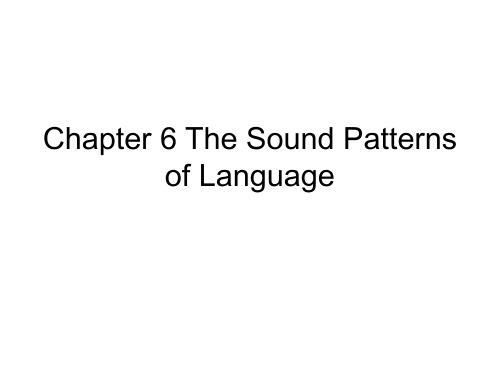
• Thus the plural morphophonemic rules apply to the plural morpheme specifically, not to all morphemes in English.
Chapter 6 The Sound Patterns of Language
Hale Waihona Puke honology vs. Phonetics
• The study of how speech sounds form patterns is phonology
• The study of speech sounds is called phonetics
Additional example
• The patterns of Plural morph II: house /haus/ thief / i:f/ belief/bili:f/ foot /fu:t/ passer-by/pas bai/
• Morpheme of past tense • The phonological presentation
The Pronunciation of Morphemes
• Plural form of English
how to pronounce the plural morpheme?
• Allomorphs of plural morpheme
• To define the distribution of allomorphs by minimal pair
• The science of phonetics attempts to describe all of the sounds used in all languages of the world.
语言学导论知到章节答案智慧树2023年潍坊学院
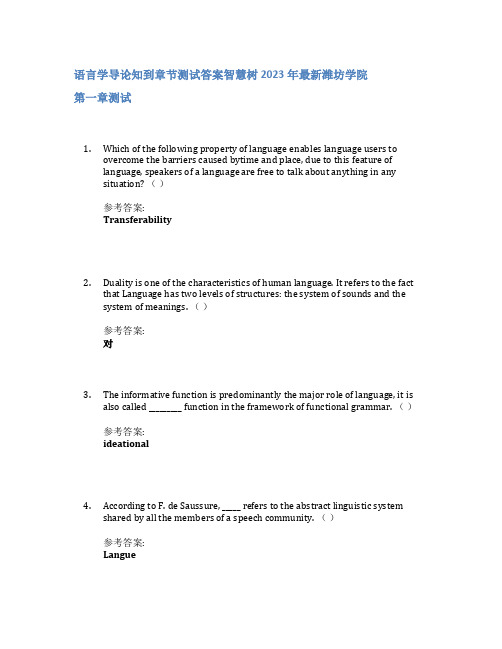
语言学导论知到章节测试答案智慧树2023年最新潍坊学院第一章测试1.Which of the following property of language enables language users toovercome the barriers caused bytime and place, due to this feature oflanguage, speakers of a language are free to talk about anything in anysituation? ()参考答案:Transferability2.Duality is one of the characteristics of human language. It refers to the factthat Language has two levels of structures: the system of sounds and thesystem of meanings. ()参考答案:对3.The informative function is predominantly the major role of language, it isalso called _________ function in the framework of functional grammar. ()参考答案:ideational4.According to F. de Saussure, _____ refers to the abstract linguistic systemshared by all the members of a speech community. ()参考答案:Languengue is relatively stable and systematic while parole is subject to personaland situational constraints. ()参考答案:对6._____ is realized by mood and modality.()参考答案:Interpersonal function7.Which of the following statements is true of Jacobson’s framework o flanguage functions?()参考答案:The phatic function is to establish communion with others8.Onomatopoeic words can show the arbitrary nature of language. ()参考答案:错petence and performance refer respectively to a language user’sunderlying knowledge about the system of rules and the actual use oflanguage in concrete situations. ()参考答案:对10.Arbitrariness of language makes it potentially creative, and conventionalityof language makes a language be passed from generation to generation. As a foreign language learner, the latter is important for us. ()参考答案:对第二章测试1.Of the consonants /p/, /t/, /k/, /f/, /m/, /z/ and /g/, which has the featuresof voiceless and velar? ()参考答案:/k/2. A sound which is capable of distinguishing one word or one shape of wordfrom another in a given language is a _______. ()参考答案:phoneme3.Which of the following CANNOT be considered as minimal pair? ()参考答案:/s/-/θ/4._______ is one of the suprasegmental features.()参考答案:Tone5.Classification of English speech sounds in terms of manner of articulationinvolves the following EXCEPT_______.()参考答案:Bilabial6.An aspirated p, an unaspirated p and an unreleased p are _______ of the pphoneme.()参考答案:Allophones7.Conventionally a_______ is put in slashes. ()参考答案:phoneme8.Which one is different from the others according to manners of articulation?()参考答案:[w]9.Which one is different from the others according to places of articulation? ()参考答案:[n]10.Which of the following is the correct description of [v]? ()参考答案:voiced labiodental fricative第三章测试1.In terms of______ , words can be divided into closed-class words and open-class words.()参考答案:membership2.Words like pronouns, prepositions, conjunctions, articles are ______ items. ()参考答案:closed-class3.Bound morphemes do not include. ()参考答案:Words4.______ refers to the way in which a particular verb changes for tense, person,or number. ()参考答案:Inflection5.Which two terms can best describe the following pairs of words: table—tables, day+break—daybreak. ()参考答案:inflection and compound6.Which of the following words are formed by blending? ()参考答案:Smog7. A prefix is an affix which appears ______.()参考答案:before the stem8.Nouns, verbs, adjectives and many adverbs are content words. ()参考答案:对9.Pronouns, prepositions, conjunctions and articles are all open class items. ()参考答案:错10.Free morpheme may constitute words by themselves.()参考答案:对第四章测试1._______ refer to the relationship that linguistic units have with other unitsbecause they may occur together in a sentence. ()参考答案:Syntagmatic relations2.The phrase “on the shelf” belongs to _______ construction.()参考答案:exocentric3.______refers to construction where one clause is coordinated or conjoinedwith another. ()参考答案:Conjoining4.IC analysis can be used to analyze all kinds of ambiguous structures.()参考答案:错5.__________ is concerned with the internal organization of words.()参考答案:Syntax6.Transformational Generative Grammar was introduced by_______in 1957.()参考答案:N·Chomsky7.Predication analysis is a way to analyze _______ meaning. ()参考答案:sentence8. A sentence is considered_______ when it does not conform to the grammaticalknowledge in the mind of native speakers. ()参考答案:wrong9.Phrase structure rules allow us to better understand_______. ()参考答案:all of the other answers10.Phrase structure rules have properties. ()参考答案:Recursive第五章测试1.“ We shall know a word by the company it keeps.” This statementrepresents___.()参考答案:contexutalism2._______is a way in which the meaning of a word can be dissected into meaningcomponents, called semantic features.()参考答案:Componential analysis3.The grammaticality of a sentence is governed by_______.()参考答案:grammatical rules4.Words which have different meanings but are written differently and soundalike are called hyponyms.()参考答案:错5.In a sentense relation of hyponymy, a superordinate entails all hyponyms. ()参考答案:对6.In componential analysis, _______be analyzed into HUMAN, ADULT and MALE.()参考答案:manponential analysis is a way to analyze _______ meaning. ()参考答案:word8.The relationship between “flower” and“rose” is _______. ()参考答案:hyponymy9.Synonymy is the technical name for the sameness relation. ()参考答案:对10.Converse opposites are pairs of words that exhibit the reveral of arelationship between the two items. ()参考答案:对第六章测试1.Promising, undertaking, vowing are the most typical of the_______. ()参考答案:commissives2.What essentially distinguishes semantics and pragmatics is whether in thestudy of meaning _________ is considereD.()参考答案:context3. A sentence is a _________ concept, and the meaning of a sentence is oftenstudied in isolation. ()参考答案:grammatical4.Which of the following is true?()参考答案:Some utterances cannot be restored to complete sentences.5.According to Searle, the illocutionary point of the representative is ______.()参考答案:to commit the speaker to something’s being the case6.All the acts that belong to the same category share the same purpose, butthey differ _________. ()参考答案:in their strength or force7._________ is advanced by Paul Grice. ()参考答案:Cooperative Principle8.Pragmatics treats the meaning of language as something intrinsic andinherent. ()参考答案:错9.It would be impossible to give an adequate description of meaning if thecontext of language use was left unconsidered.()参考答案:对10.What essentially distinguishes semantics and pragmatics is whether in thestudy of meaning the context of use is considered.()参考答案:对第七章测试1.is defined as any regionally or socially definable human group identified byshared linguistic system. ()参考答案:A speech community2._______is a casual use of language that consists of expressive but nonstandardvocabulary, typically of aibitrary, flashy and often ephemeral coinages andfigures of speech. ()参考答案:Slang3.In a speech community people have something in common_______--a languageor a particular variety of language and rules for using it. ()参考答案:linguistically4._______refers to the use of a word which is thought to be less offensive orunpleasant than another worD.()参考答案:Euphemism5.The most distinguishable linguistic feature of a regional dialect is its_________.()参考答案:accent6._______are the major source of regional variation of language. ()参考答案:Geographical barriers7.Linguist______published his paper “The social stratifi cation of English in NewYork City”in 1966. ()参考答案:Labow8. A regional variety of a language is intrinsically inferior to the standardvariety of that language.()参考答案:错9.The standardization of a particular dialect in relation to one or morevernaculars is the result of a deliberate governmental policy. ()参考答案:错10. A pidgin is not a native language of a particular region.()参考答案:对。
江苏大学外国语学院王祥语言学导论第六章morphology
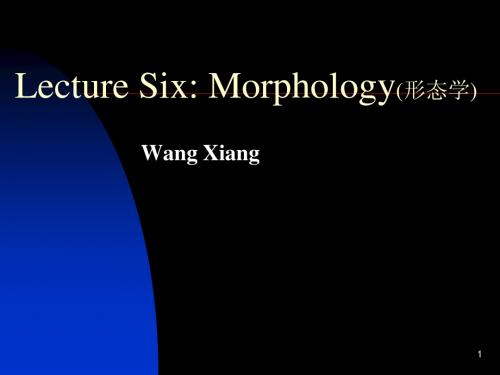
Morphemes, Morphs and Allomorphs
Morpheme(语素) Derived from the Greek word ―morphe‖ = ―form‖. — minimal units of meaning out of which meaningful utterances are built. A morpheme is an arbitrary union of a sound and a meaning that cannot be further analyzed.
open (content, lexical) or closed (functional, grammatical)
Open class: words which denote concepts such as objects, actions, attributes, and ideas.
nouns, verbs, adjectives and adverbs
Morpheme = syllable? A morpheme can be less than a syllable: /s/ (―plural‖), One syllable: /kæt/ (―cat‖) disyllabic: /rainәu/ (―rhino‖).
13
Morphemes = words? cats: one word but with two morphemes ―cat‖ and ―plural‖ A morpheme may even have no phonemic ―content‖ at all: sheep in two sheep two morphemes ―sheep‖ + ―plural‖
语言学导论第6章Pragmatics

Principle of conversation 会话原则
E.g., -A: would you like to come to our party tonight?
E.g.,
cultural background, situation (time, place, manner, etc.) the relationship between the speaker and the hearer …
Pragmatics vs. Semantics
Semantics: (no context) the study of the literal meaning of a sentence
E.g.,
I name this ship Elizabeth. I now declare the meeting open.
Expressives
Expressing the speaker’s psychological state about something,
E.g.,
It’s really kind of you to have thought of me. I apologize for the sufferings that the war has
E.g., “The bag is heavy.”
“The bag is heavy”
sentence meaning:
a bag being heavy
utterance meaning:
an indirect, polite request
asking the hearer to help him carry the bag
declining someone’s request for help … utterance meaning:
语言学第六章Part One
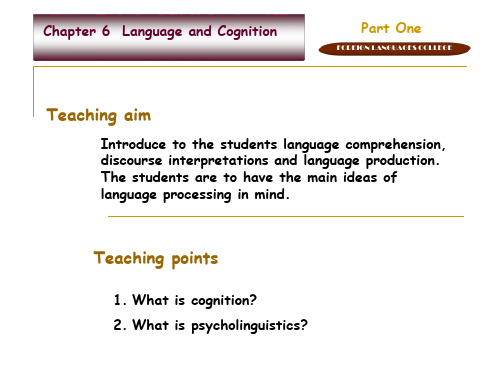
What that? Andrew want that. Not sit here.
Embed one constituent inside another:
Give doggie paper. Give big doggie paper.
Teaching points
1. What is cognition? 2. What is psycholinguistics?
Commonalities between language and cognition:
childhood cognitive development (Piaget):
[haj]: hi [s]: spray [sr]: shirt, sweater [sæ:]: what’s that?/ hey, look! [ma]: mommy [dæ ]: daddy
Fromkin,V., Rodman, R., & Hymans, N. (2007)An Introduction to Language (8th Ed.). Singapore/Beijing: Thompson/PUP
Two-word stage: around 18m
Child utterance Want cookie More milk Joe see My cup Mature speaker I want a cookie I want some more milk I (Joe) see you This is my cup Purpose Request Request Informing Warning
1. Diaries-Charles Darwin; 2. Tape recorders; 3. Videos and computers. Eg. Dr. Deb Roy (MIT)
语言学导论复习纲要
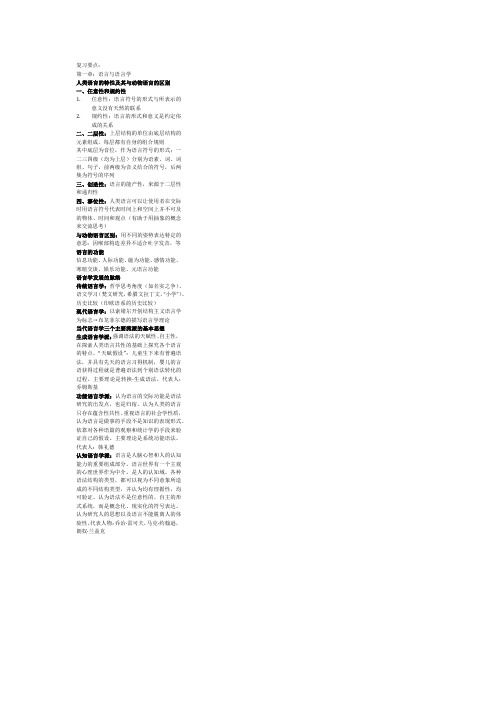
区分辅音:发音部位、阻碍方法、声带状况 和气流节制。 掌握英汉中元辅音的特征: 元音差别: • 除了央元音/ə/之外几乎没有一 个处在相同部位的。 英语中的元 音都是舌面音, 没有舌尖元音和 卷舌元音。 • • 英语元音分布比较均匀, 而汉语 元音分布不够均匀, 高元音居多。 英语中的元音有长短的差别 (如 beat 和 bit,fool 和 full) ,而汉 语没有。 • • 英语前元音没有圆唇音, 而后元 音多为圆唇音。 汉语中的元音元音基本上在极 限位置上, 而英语中的语音并非 如此。 • 辅音差别: • 英汉辅音在发音部分方面虽然 有诸多相似之处, 但它们的发音 方法和发音机制有着细微的差 别。 • 英语辅音有清浊之分, 而汉语辅 音的区别并不全在清浊, 除了几 个个别的浊音,如鼻音、边音, 其余的擦音、 塞音和塞擦音的区 别在于送气与否。 • 此外, 英语辅音时长较短, 单念 时不允许延长; 汉语辅音无论是 清是浊, 无论送气不送气, 单念 时听起来较长, 似乎后面跟了一 个短暂的/ə/音。 音位和音位变体: • • 音位: 某种语言或方言中具有区 别意义功能的最小语音单位。 音位变体: 属于同一个音位的各 个音素叫音位变体。 音位变体就 是音位在语音环境中的实际发 音。 音系规则的描述方法:斜线表示变化产生的 环境,横线(称为焦点线)表示目标音段的 位置。例子如图: 汉语还有鼻化元音。
原则与参数理论 XP 规则是一个普遍规则, 语言之间的差别在 于参数不同。 The fact that Japanese and English differs due to the parameter of variation among languages, or parameter, for short.
移位与疑问句 移位的起因通常为话题化,就是根据不同的 话题而将句子成分改变位置,通常是提前。 比如一般疑问句中, 会出现 I-to-C movement, (屈折语转为补足语;一个假设:A null C triggers the movement in English questions. ) ;而特殊疑问句中会出现 Wh-movement(基于 I-to-C movement 的移 位,形成补足语短语的标志) Principle C C-command: A node alpha c- commands a node beta iff: the mother of alpha dominates beta, and alpha does not dominate beta. Principle C: If a pronoun NP x c-commands a full NP y, x and y may not be coreferent. What do we get: Although syntactic structure is independent of meaning in many ways, they do interact in many ways.
英语语言学概论 Chapter 6 Syntax

6.4 IC Analysis, ….
IC Analysis of sentences: to divide the words of a sentence into two groups, and then divide each group into subgroups and so on, until the single words of the sentences are obtained. It is a major feature of Bloomfieldian Structuralist linguistics(布龙菲尔德结构 布龙菲尔德结构 主义语言学的主要特征) 主义语言学的主要特征
Chapter 6 Syntax
A study of sentences:sentence structure and formation
6.1 definition of syntax:how the words of a language can be combined to make larger units, such as phrases, clauses(分句 and sentences. It studies 分句) 分句 the interrelationships between elements of the sentence structure and the rules governing the production of sentences
Finite(有限的 有限的)number of words and 有限的 small set of rules can create infinite number of sentences Syntactic knowledge: the intuition of native speakers about how words are combined to be phrases and sentences.
语言学教学大纲
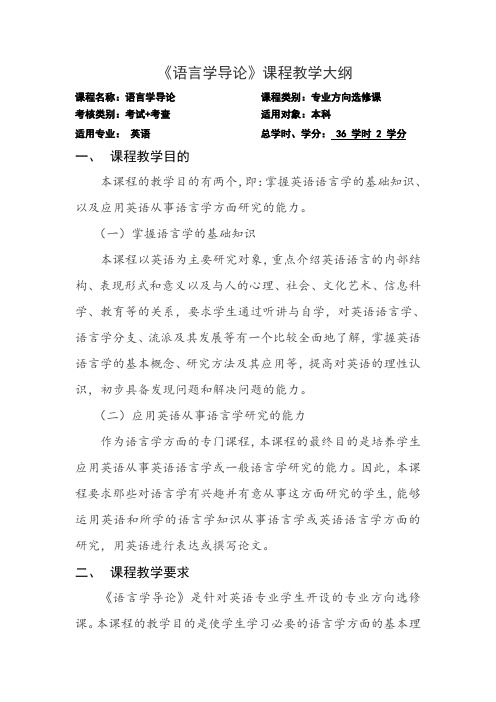
《语言学导论》课程教学大纲课程名称:语言学导论课程类别:专业方向选修课考核类别:考试+考查适用对象:本科适用专业:英语总学时、学分: 36 学时 2 学分一、课程教学目的本课程的教学目的有两个,即:掌握英语语言学的基础知识、以及应用英语从事语言学方面研究的能力。
(一)掌握语言学的基础知识本课程以英语为主要研究对象,重点介绍英语语言的内部结构、表现形式和意义以及与人的心理、社会、文化艺术、信息科学、教育等的关系,要求学生通过听讲与自学,对英语语言学、语言学分支、流派及其发展等有一个比较全面地了解,掌握英语语言学的基本概念、研究方法及其应用等,提高对英语的理性认识,初步具备发现问题和解决问题的能力。
(二)应用英语从事语言学研究的能力作为语言学方面的专门课程,本课程的最终目的是培养学生应用英语从事英语语言学或一般语言学研究的能力。
因此,本课程要求那些对语言学有兴趣并有意从事这方面研究的学生,能够运用英语和所学的语言学知识从事语言学或英语语言学方面的研究,用英语进行表达或撰写论文。
二、课程教学要求《语言学导论》是针对英语专业学生开设的专业方向选修课。
本课程的教学目的是使学生学习必要的语言学方面的基本理论和基本知识,掌握研究、运用语言的基本方法,为今后的工作打下坚实的基础。
在课程结束时,学生需达到以下要求:(一)了解语言的本质特征,语言的功能、语言学中的重要区别及普通语言学的主要分支。
(二)系统了解语言学各分支的知识,即语音学、音位学、词汇学、句法学、语义学、语用学等的基本内容及研究方法。
(三) 了解语言学与其他相关学科交叉所形成的学科,如心理语言学、社会语言学、应用语言学等的基本知识与研究方法。
(四)了解语言学主要流派的基本观点。
(五)能够用英语从事语言学方面的研究,撰写语言学方面的论文。
三、先修课程语音、语法、听力、口语等专业基础课程,基础英语等专业核心课程以及阅读、词汇学等专业方向课程。
四、课程教学重、难点(一)重点:1. 语言的定义特征,语言学的主要分支;2. 元音和辅音的类别以及描述方法,音位过程;3. 词素的定义和分类,词的构成方法;4. 三种句法关系,向心结构和离心结构;5. 单词与句子的涵义关系;6. 合作原则与会话含义。
《语言学概要》(叶蜚声)版 第六章 文字(思维导图)

第六章 文字第一节 文字和语言一、文字在人类历史上的重要作用1.文字的发明克服了语言传达信息在时间和空间上的局限,使一发即逝的语言可以“传于异地,留于异时”。
2.文字使人类文化得以积累。
3.文字能促进思维的发展。
二、文字的基本性质文字的基本性质:文字是用书写/视觉形式对语言进行再编码的符号系统。
文字有字音、字形、字义三方面。
三、汉字和汉语汉字和汉语的特点是相适应的:汉字的特点:一个汉字基本上只记录一个音节,一个音节只用一个汉字来记录。
汉语的特点:有声调的语言,汉语方言分歧大。
第二节 文字的基本性质与文字的产生一、实物记事结绳记事讯木记事二、图画记事三、刻划符号四、早期文字:原始的图画文字判定文字系统已经产生,有三个基本的条件:1.具有数量足够多的与某种语言里的语素或词相对应的小图形,这些小图形可以按这种语言的音读出来。
2.这些小图形可以重复使用而所表达的音义不变。
3.这些小图形的排列规则足以反映这种语言说话时语素或词的排列次序,小图形排列的顺序不同,所反映的语言单位的排列次序也就不同,表达的意思也因此不同。
文字形体所表达的信息一定是与某种语言的音义结合体及其排列相对应的信息,而不是直接描画现实。
记事方法第三节 共时文字系统的特点及分类一、从文字的次小单位看文字的共性和分类文字的共性:任何文字系统都有一级单位对应于语言中的音义结合体。
文字的最小单位一定要比语言音义结合体的数量要少,最小文字单位要组合起来才与语言中的音义结合体对应。
汉语的方块字:语素——音节文字英语的文字词:语法词——音系词文字(表词文字)二、从文字的最小单位看文字的不同类型字符:所有文字的最小单位统称为“字符”。
文字分为表音文字:又叫做“拼音文字”或“字母文字”,它们的最小文字单位——字符只表示语言符号的音,而不表示语言符号的意义。
音位文字:有的字符表示元音,有的字符表辅音,字符可以记录语言中所有的音位,用二三十个有限的字母记录语言中的全部音节,进而书写全部的词和句子。
新编语言学导论
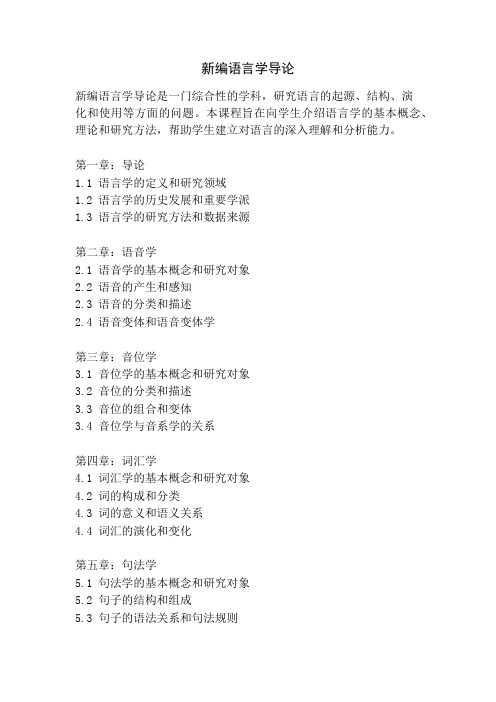
新编语言学导论新编语言学导论是一门综合性的学科,研究语言的起源、结构、演化和使用等方面的问题。
本课程旨在向学生介绍语言学的基本概念、理论和研究方法,帮助学生建立对语言的深入理解和分析能力。
第一章:导论1.1 语言学的定义和研究领域1.2 语言学的历史发展和重要学派1.3 语言学的研究方法和数据来源第二章:语音学2.1 语音学的基本概念和研究对象2.2 语音的产生和感知2.3 语音的分类和描述2.4 语音变体和语音变体学第三章:音位学3.1 音位学的基本概念和研究对象3.2 音位的分类和描述3.3 音位的组合和变体3.4 音位学与音系学的关系第四章:词汇学4.1 词汇学的基本概念和研究对象4.2 词的构成和分类4.3 词的意义和语义关系4.4 词汇的演化和变化第五章:句法学5.1 句法学的基本概念和研究对象5.2 句子的结构和组成5.3 句子的语法关系和句法规则5.4 句法的演化和变化第六章:语义学6.1 语义学的基本概念和研究对象6.2 词义的分类和描述6.3 句义的组成和解释6.4 语义的演化和变化第七章:语用学7.1 语用学的基本概念和研究对象7.2 语用的层次和关系7.3 言语行为和语用推理7.4 语用的演化和变化第八章:社会语言学8.1 社会语言学的基本概念和研究对象8.2 语言变体和社会变量8.3 语言的社会意义和社会身份8.4 社会语言学的应用和研究方法第九章:心理语言学9.1 心理语言学的基本概念和研究对象9.2 语言的认知过程和心理机制9.3 语言的发展和习得9.4 心理语言学的应用和研究方法第十章:语言学研究的前沿和挑战10.1 当代语言学的研究热点和趋势10.2 语言学研究的跨学科合作10.3 语言学研究的伦理和道德问题10.4 语言学研究的未来发展方向本课程将通过理论讲解、案例分析和实践操作等多种教学方法,帮助学生理解和应用语言学的基本原理和方法,培养学生的批判性思维和研究能力,为进一步深入研究语言学或相关学科打下坚实的基础。
新编简明语言学导论教程课件Chapter 6
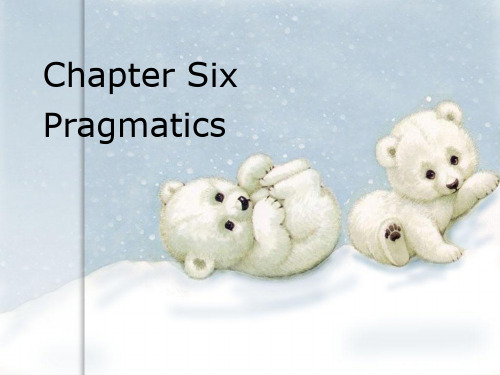
Presupposition
“ Your girlfriend is waiting outside for you.” “ How often do you cheat in your examinations?”
Correctness vs. appropriateness
3. If you say something grammatically incorrect, you are at worse condemned as “speaking badly”, 4. but, if you say something inappropriately, you will be judged as “behaving badly”, such as insincere, untruthful, or deceitful.
such as cultural background, situation (time, place, manner, etc.), the relationship between the speaker and the hearer, etc.….
Pragmatics vs. semantics
Correctness vs. appropriateness
Note:
1. Pragmatics can make sense out of nonsense, given a suitable context. 2. Appropriateness is very important in linguistic communication, especially in cross-cultural communication.
英语语言学导论知到章节答案智慧树2023年西安外国语大学
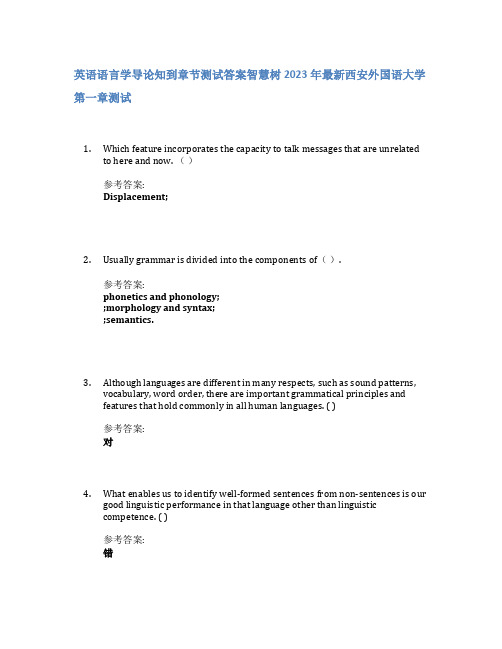
英语语言学导论知到章节测试答案智慧树2023年最新西安外国语大学第一章测试1.Which feature incorporates the capacity to talk messages that are unrelatedto here and now. ()参考答案:Displacement;ually grammar is divided into the components of().参考答案:phonetics and phonology;;morphology and syntax;;semantics.3.Although languages are different in many respects, such as sound patterns,vocabulary, word order, there are important grammatical principles andfeatures that hold commonly in all human languages. ( )参考答案:对4.What enables us to identify well-formed sentences from non-sentences is ourgood linguistic performance in that language other than linguisticcompetence. ( )参考答案:错5.The fact that a parrot can be taught to reproduce some human speech soundsproves that human language is not unique to us. ( )参考答案:错第二章测试1.How many morphemes are there in the word “frightening”? ( )参考答案:three2.Which of the following two-term sets shows the feature of complementarity?( )参考答案:single/married3.The word “man” is an alyzed as comprising the semantic features of[+human,+adult,+male]. ( )参考答案:对4.“-tain” in words like “maintain”, “sustain”, “retain” is a ( ).参考答案:bound root5.Tree diagrams are used to represent the linear structure of words. ( )参考答案:错第三章测试1.Phrase structure rules allow us to better understand _____________. ( )参考答案:All of the above.2.The sentence structure is ________. ( )参考答案:both linear and hierarchical3.The syntactic rules of any language are ____ in number. ( )参考答案:finite4.In English syntactic analysis, four phrasal categories are commonlyrecognized and discussed, namely, noun phrase, verb phrase, infinitivephrase, and auxiliary phrase. ( )参考答案:错5.What is actually internalized in the mind of a native speaker is a complete listof words and phrases rather than grammatical knowledge. ( )参考答案:错第四章测试1.Reflected meaning arises in cases of multiple conceptual meanings, when onesense is associated with another sense. ( )参考答案:对2.The lexical relationship between “bear” and “bare” is hyponymy. ( )参考答案:错3.The sentence It is hot is a one-place predication. ( )参考答案:错4.Pragmatics is the study of language meaning. ( )参考答案:错5.According to John Searle’s classification of speech acts, “he promises to cometomorrow” is ( ).参考答案:representative第五章测试1.Which one is different from the others according to place of articulation? ( )参考答案:[n]2.Which of the following is NOT a front vowel? ( )参考答案:[u:]3.[z] is a voiceless, alveolar fricative consonant while [j] is a palatalapproximant. ( )参考答案:错4.[p] is a voiced bilabial stop. ( )参考答案:错5.Perceptual phonetics is concerned with the perception of speech sounds. ( )参考答案:对第六章测试1.Distinctive features can be found running over a sequence of two or morephonemic segments. The phonemic features that occur above the level of the segments are called ( ).参考答案:suprasegmental features2.How many morphemes are there in the word “discharged”? ( )参考答案:33.Which of the following statements about allophone is NOT correct? ( )参考答案:Allophones distinguish meaning.4. A phoneme in a language is a distinctive sound which is capable ofdistinguishing one word or one shape of a word from another. ( )参考答案:对5.Phonology is concerned with how the sounds can be classified into differentcategories. ( )参考答案:错第七章测试pared with langue, parole is chaotic and therefore impossible to study. ( )参考答案:错2.The common types of language variation are variation. ( )参考答案:all of above3.William Labov’s New York Department Store study is basically about regionalvariation of language. ( )参考答案:错nguage contact could lead to the death of a language. ( )参考答案:对5.When speakers from different languages interact with each other, one of thenative languages of the speakers could be used as a lingua franca. ()参考答案:错第八章测试1.There are five major stages in the history of English language change. ( )参考答案:对2.Who is the editor of Dictionary of the English language? ( )参考答案:Samuel Johnson3.The lexical change includes: ( )参考答案:borrowing or Loan Words;the addition of new words;change in lexical category;loss of words4.The word change from “bathe” to “bath” is syntactic change ( )参考答案:错5.Changes in a language are changes in the grammars. ()参考答案:错第九章测试1.Traditional behaviourists view language as a kind of behaviour and believethat language learning is simply a matter of imitation and habit formation. ( ) 参考答案:对2.Chomsky proposed that human beings are born with an innate ability knownas _______. ( )参考答案:Language Acquisition Device, or LAD3.Unlike L1 acquisition, which is uniformly successful across children andlanguages, adults vary considerably in their ability to acquire an L2completely. ( )参考答案:对4.What are the three interacting factors in determining language transfer insecond language learning? ( )参考答案:A learner’s perception of native-target language distance.;A learner’s actual knowledge of the target language.;A learner’s psychology, how a learner organizes his or her nativelanguage.5.The native language influences not only occur as direct linguistic reflexes atphonological, lexical, semantic, syntactical or discoursal levels but alsodirectly reflect underlying organizational principles of languages at thecognitive level. ( )参考答案:对第十章测试1.Which area of linguistics studies the cognitive processes of how we use ourlinguistic competence in speech production and comprehension? ( )参考答案:Psycholinguistics2.In psycholinguistic experiments which of the following is frequently used asan important measurement of how quick a person responds to linguisticsignals. ( )参考答案:Response time (RT)3. A central problem of speech perception is to explain how listeners carve upthe continuous speech signal into meaningful unit. This is referred to as the segmentation problem. ( )参考答案:对4.In Top-down processing listeners move step-by-step from the incomingsignal, to phonemes, morphemes, words and phrases and ultimately tosemantic interpretation. ( )参考答案:错5. A listener will respond faster at making lexical decision on related wordssuch as doctor and nurse than if he just heard unrelated word such as doctor and flower. This is possibly because words in the first pair are semantically related. ( )参考答案:对第十一章测试1.Many people use the search features of the Internet to find information.Typically, one enters a keyword, or perhaps several, and magically thecomputer returns the location of Web sites that contain information relatingto that key-word. This process is an example of ( ).参考答案:information retrieval2.Many crimes involve anonymous recorded messages in which it is importantto identify the speaker. ______ is the use of computers to assist in such a task,as opposed to ear witnessing, which relies on the judgment of humanlisteners. ( ).参考答案:Speaker identification3.The field of computational lexicography is concerned not only with themaking of standard dictionaries but also with the building of electronicdictionaries specifically designed for computational linguists. ( )参考答案:对4.Speech synthesis is a two-step process in which a text-to-speech programfirst converts text to phones or other basic units such as words or syllables. ( ) 参考答案:对5.The computational linguistics of speech understanding and speechgeneration has the subfields of computational phonetics and phonology,computational morphology, computational syntax, computational semantics, and computational pragmatics. ( )参考答案:对第十二章测试1.The history of writing includes____. ( )参考答案:Cuneiform Writing;pictograms and ideograms;from hieroglyphics to the Alphabet writing;the Rebus principle2.ʘrepresents the sound “___” ( )参考答案:sun3.The current English is a kind of picture system. ( )参考答案:错4.The Phoenician living in the area from hieroglyphics to the Alphabet writing.( )参考答案:对5.“cat cats cat’s cats’”have four morphemes. ( )参考答案:错第十三章测试1.The Prague School is a school of linguistic thought and analysis established inPrague in the 1920s by Mathesius. ()参考答案:对2.The major linguistic schools include ( )参考答案:The Formalism;The Functionalism;The Structuralism;The cognitivism3.The major scholars mentioned in American Structuralism are ( )参考答案:Franz Boas;Leonard Bloomfield;Edward Sapir4.The famous linguistic work Metaphors We live By is composed by RonaldLangacker。
语言学第六章

Topic 6
Semantics
Chapter 5 Semantics
Definition The study of meaning. What is meaning?
2. Some views concerning the study of meanings.
4. Major sense relations
4.1. synonymy dialectal synonyms stylistic synonyms synonyms with emotional and evaluative differences collocational synonyms semantically different synonyms 4.2. polysemy 4.3. homonymy 4.4. hyponymy
The truth of one sentence necessarily implies the falseness of another sentence, for example: Elizabeth II is queen of England. Elizabeth II is a man. Scott is a baby. Scott is an adult.
Componential analysis-verbs
Take=CAUSE (x, (HAVE (x, y)))…………….x causes x to have y Give=CAUSE (x, (~HAVE (x, y))) Die=BECOME (x, (~ALIVE(x))) Kill=CAUSE (x, (BECOME (y, (~ALIVE(y))))
英语语言学 第六章

the use of context to make inference
about meaning.
Semantic meaning & Pragmatic meaning:
• Semantic meaning: the more constant,
inherent side of meaning • Pragmatic meaning: the more indeterminate, the more closely related to context
Speaker’sFra bibliotekmeaning
A father is trying to get his 3-year-old
daughter to stop lifting up her dress to
display her new underwear to the assembled
guests.
Father:
Pragmatics can be defined as the
study of how speakers use the
sentences of a language to effect
successful communication.
It is the study of language in use or language communication; the study of
What essentially distinguish semantics
and pragmatics is whether in the
study of meaning the context of use is considered. Parent: Where are your shoes, young man? Child: Under my bed.
- 1、下载文档前请自行甄别文档内容的完整性,平台不提供额外的编辑、内容补充、找答案等附加服务。
- 2、"仅部分预览"的文档,不可在线预览部分如存在完整性等问题,可反馈申请退款(可完整预览的文档不适用该条件!)。
- 3、如文档侵犯您的权益,请联系客服反馈,我们会尽快为您处理(人工客服工作时间:9:00-18:30)。
pragmatics语用学 --- the study of how speakers of a language use sentences to effect successful communication
Preliminaries: 1. If you ask somebody “Can you open the door?” he answers “Yes” but does not actually do it, what would be your reaction? Why? 2. If you are going shopping with your friend and she says to you “the bag I‟m carrying is heavy”, what does she possibly mean?
Analyze the locutionary, illocutionary and perlocutionaly acts contained in the following sentences: • A teacher entered the classroom and saw all the windows were closed. Then he said to his students, “It is hot here. ” • A little girl is visiting a doll store with her mum and she says to her mum, “Mummy, the doll is so cute. ”
• commissives承诺类: I will return the book to you next week without fail. I will never do it again. • expressives表达类: I‟m sorry to hear that. Thank you very much! Happy birthday! I‟m glad to see you again. • declarations宣告类: I now declare the ceremony close. You are fired.
•
Decide the meaning of ‘Shakespeare’ in the following sentences: 1. Shakespeare takes up the bottom shelf. 2. We‟re going to see Shakespeare in London. 3. I hated Shakespeare at school.
Constatives: 1. Our classroom is 20 meters wide, 30 meters long. 2. Cathy is 21 years old. 3. The earth is round. 4. Edinburgh is in Scotland. 5. George Bernard Shaw was a playwright. 6. Every morning I have a cup of milk and some breaeech acts (John Searle) primary speech acts secondary speech acts e.g. A: Let‟s go to the movies tonight. B. I have to study for an exam.
3. Searle‟s classification of illocutionary acts: • representatives • directives • commissives • expressives • declarations
• representatives阐述类: (I swear) I have never done it. (I state) The earth is globe. • directives指令类: You‟d better change your idea. Would you like a cup of tea? Why don‟t you ask for your parent‟s opinions? Your money or your life! Silence, please.
Only when a maxim is “flouted”, to use Grice‟s term, does “conversational implicature会话含义” occur. Flouting a maxim means violating it blatantly, i.e. both the speaker and the hearer are aware of the violation. When we flout a maxim, our language becomes indirect.
5. “The Club” is a device for blocking an automobile‟s steering wheel, thus protecting the car from being stolen. And one of its ads reads: THE CLUB! FD Anti-theft device for cars POLICE SAY: „USE IT‟ OR „LOSE IT‟ 6. 买一送一
(3) The Cooperative Principle (by Paul Grice): In making conversation, the participants must be willing to cooperate and observe the Cooperative Principle. • four maxims under this principle: The maxim of quantity The maxim of quality The maxim of relation The maxim of manner
Performatives: 1. I name this ship Queen Elizabeth. 2. I bequeath my watch to my brother. 3. I bet you six pence it will rain tomorrow. 4. I promise to finish it in time. 5. I apologize. 6. I declare the meeting open. 7. I do.
(2) speech act theory (by John Austin) • While we are speaking, we are performing some acts at the same time. 1.constatives vs. performatives • Constatives叙事句 are statements that either state or describe, and are thus verifiable. • Performatives施为句 are sentences that are not used to state or describe, but used by the speaker to do things. They are not verifiable.
Point out the implied meaning or implicatures in the following examples: 1.Mr. A is writing a reference letter for his past student B, who is applying for a lectureship in philosophy. The letter reads, “Dear Sir, Mr. B‟s command of English is excellent, and his attendance at tutorials has been regular. Yours, etc.” 2.A boy says to a girl, “你不戴眼镜的时候很漂 亮”.
2.new models of speech act theory: A speaker might be performing three acts simultaneously when speaking: • locutionary act言内行为 (the act of conveying literal meaning) • illocutionary act言外行为 (the act of expressing the speaker‟s intention) • perlocutionary act言后行为 (the act performed by saying something, the consequence of, or the change brought about by the utterance)
5. Implicatures conventional implicature non-conventional implicature e.g. She is beautiful but she is easy-going. e.g. A: Where is the steak? B: The dog looks very happy.
Decide which of the four maxims is violated in the following conversations/ads: 1. A: Can you tell me where you live? B: Somewhere in Guangzhou. 2. A young man is introducing himself to a girl at a ball: I‟m Robert Sampson from Leeds, 28, unmarried. 3. A: Let‟s get the kids something. B. Okay, but I veto I-C-E C-R-E-A-M. 4.A: Miss Li‟s lecture is really boring. Don‟t you think so? B: I‟ve got two tickets for tonight‟s show. Shall we go together?
